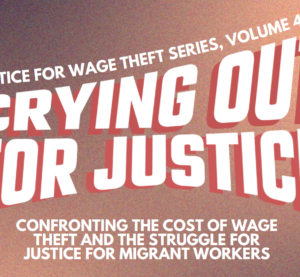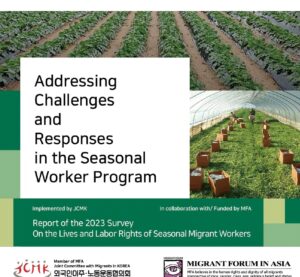The Diplomacy Training Program on Migrant Workers Convention
— August 22, 200515-20 August 2005 : The Diplomacy Training Program on Migrant Workers Convention was co-organized by the Migrant Forum in Asia and was hosted by its member organizations in Bangladesh, Welfare Association for Repatriated Bangladeshi Employees (WARBE) and Refugee and Migratory Movement Research Unit (RMMRU). The course brought together human rights defenders currently working on the rights of migrant workers and trade unionists. The course content focused on the ICRMW in the context of the broader human rights framework, identifying the key challenges to implementing the ICRMW in the Asia–Pacific region and the development of practical advocacy skills. The course also provided the participants background knowledge about key aspects of the ICRMW and its monitoring and reporting regime. Additionally, the program provided a venue for the participants to develop practical skills in advocacy, lobbying and working with the media to advance migrant workers’ rights.
DTP is The Diplomacy Training Program (DTP) is an independent, non-governmental organization providing human rights education, which seeks to advance human rights and empower civil society in the Asia Pacific region through quality education and training, and the building of skills and capacity in non-governmental organizations. (http://www.dtp.unsw.edu.au)
Speech by the Chief Guest:
Dr. Syed Refaat Ahmed
Justice of the Supreme Court of Bangladesh
Ladies and Gentlemen,
Good Afternoon,
I must begin by commending you on your participation in varied capacities in this Migrants Rights Programme as has, I’m sure, engaged you over the last several days in a fruitful scrutiny of the 1990 UN Convention on the Rights of Migrants Workers and the Members of Their Families in all its aspects.
I perceive that engagement as an essential step towards equipping all concerned as facilitators in this effort for securing an international legal regime for migrant workers comprising of norms, laws and institutions accepted and supported by a substantial segment of the international community. Success in this regard, as you will appreciate, will be largely depended on the extent to which the regime strikes that essential and crucial balance among the often competing interests of the primary actors, i.e. the migrants themselves, the sending states and the receiving states. Efforts to this end would entail a sustained examination and evaluation of such of the Convention- provisions as are in evidence of the essential components of regime creation, such as state responsibility, state accountability and the balance of interests, as well as of the manner in which any Convention- deficiency in this regard may be overcome.
The regime objective would be to bring a motley collection of states to adhere to principles to Human Rights protection and orderly management under a framework of mutually reinforcing state obligations and understanding carried out in their totality rather than selectively. Notion of ‘international solidarity’, ‘burden sharing’ and ‘quid pro quo’ should constitute the key components of the promotion of sound, equitable, humane and lawful conditions of migration as declared in part VI of the Convention.
The part VI provisions constitute a lynchpin to any effective implementation of the Convention’s declaration of rights, norms and standards. Nowhere, perhaps, is that need for implementation more pressing than in addressing the issue of undocumented migration. The part VI provisions could therefore very well be a standard reference, for example, for establishing migration networks where these do not exist in order that the resultant regular and organized channels of migration emerge as better and safer option in preference to the clandestine ones. Further, concerted state effort, as endorsed by the Article 67 in particular, must be the essential premise for ensuring that the repatriation of the migrant workers, and specially those who are undocumented, take place under conditions protective in the very least, of the rights to life and security of person otherwise secured under Articles 9, 10 and 22 of part III of the Convention.
To that end, I hope that your collective efforts in this regard will yield due and proper results. Human Rights enthusiasts, activists and organisations alike shall have to ensure that the cession of sovereignty by state-parties to the Convention to the extent of subjectivity themselves under Article 79 “to the limitation set forth in the… Convention…concerning…matters (relating) to (the) legal situation and treatment (of) migrant workers and members of their families” is real and substantive. Otherwise, it would be a pity that despite the ready-availability in the Convention of standards of protection, control and regulation, we prove to effectively draw on the same to meet any number of contingences and crisis.
The task so set may not be easy, if only going by the arduousness of the ten years of negotiations leading to the adoption of the Convention in 1990. But that notwithstanding, the broad consensus reached ultimately in adopting the Convention must now be made to prevail in the actual implementation of the Convention. This must be reflected in further ratification of the Convention across the entire spectrum encompassing sending, transit and indeed receiving states and incorporation of the Convention-standards into municipal laws by legislation and/or sustentative compliance. I would submit that the interest of the main beneficiaries of such an emergent regime would be best served if action in this regard in taken without undue delay.
In this view of this matter, I thank RMMRU, WARBE, MFA and the Diplomacy Training Programme for the very timely initiative. And of course, I applaud you, the participants, in your commitment and contribution to this very worthy effort and wish you all the best in your future endeavours.
Thank you.



